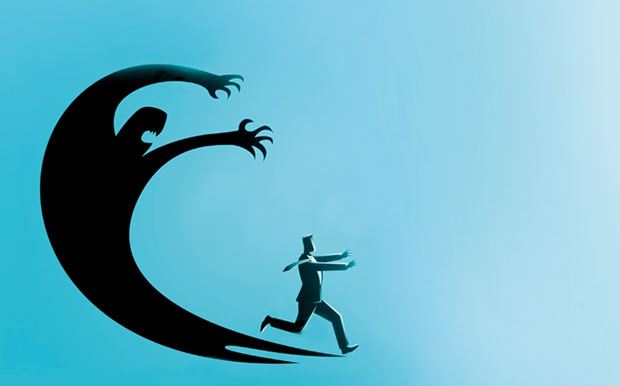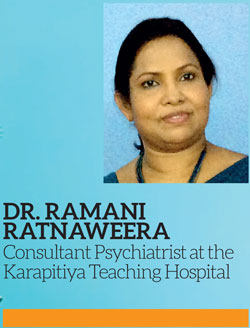Reply To:
Name - Reply Comment
Last Updated : 2024-04-26 10:26:00

 Does that crooked stack of books bother you? Or do you want to get rid of all the dust on your hands? As much as it’s healthy to be clean, being overly clean is a problem in terms of psychology. The majority of us would have cried when our parents left us on the first day at school. You may even have bathed an extra few minutes these days as it is terribly warm. But if you bathe for a few hours or wash your hands for almost an hour, on repeated occasions, then you are most likely to have developed an anxiety disorder!
Does that crooked stack of books bother you? Or do you want to get rid of all the dust on your hands? As much as it’s healthy to be clean, being overly clean is a problem in terms of psychology. The majority of us would have cried when our parents left us on the first day at school. You may even have bathed an extra few minutes these days as it is terribly warm. But if you bathe for a few hours or wash your hands for almost an hour, on repeated occasions, then you are most likely to have developed an anxiety disorder!
Definition
The American Psychological Association (APA) defines anxiety as an emotion characterized by feelings of tension, worrying thoughts and physical changes that leads to increased blood pressure. Speaking to the Daily Mirror, Consultant Psychiatrist at the Karapitiya Teaching Hospital, Dr. Ramani Ratnaweera said that both children and adults could develop anxiety. “In fact anxiety could be felt when an infant is in the womb if the mother is feeling anxious or when her heartbeat increases. Eventually children can experience anxiety disorders,”Dr. Ranaweera said.
Ever since the earliest days of humanity, the approach of predators and incoming danger have set off alarms in the body and allowed an individual to take evasive action. These alarms become noticeable in the form of a raised heartbeat, sweating, and increased sensitivity to the surroundings.
Types 
Anxieties now revolve around work, money, family life, and other crucial issues that demand a person’s attention without necessarily requiring the ‘fight-or-flight’ reaction. The duration or severity of an anxious feeling can sometimes be out of proportion to the original trigger, or stressor. There are several types of anxiety disorders including ; Separation anxiety, Social anxiety, Obsessive Compulsive Disorder and Post-traumatic Stress Disorder.
Separation anxiety
According to Dr. Ratnaweera, separation anxiety develops in children when they are between 18 months and three years.
“Normally children would feel anxious if they don’t see their mother around. If the parents aren’t in sight for a longer period of time, it would affect the child as well. Some of the common symptoms of separation anxiety include excessive homesickness and feeling miserable at times. This is quite evident in pre-school children who would cry if they don’t see their parents. Therefore parents and teachers should be responsible during these situations and provide a safe environment for children in a way that they wouldn’t feel anxious the moment their parents leave them in the classroom.
Eventually they will be confident that they will be safe even if their parents aren’t around.
If this situation isn’t handled at its early stages it would lead to an unpleasant future. Some children say that they don’t want to go to school and this may be because of separation anxiety,”she explained.
Separation anxiety which is associated with people whom individuals are attached to is a normal part of early development, particularly in the first few years of life. Anxiety poses a problem when it is excessive and given that it affects a person’s level of development. This type of anxiety causes some form of dysfunction in the person’s life.
Social anxiety
“Social anxiety is characterised by intense fear of social situations or performances. It includes fear of going to crowded places, reluctance to socialise with peers. This would be worse if a child experiences bullying at school. If there are good peers around your child, the impact of this situation will be lesser. This will be carried on to adolescent if not treated at an early stage,” added Dr. Ratnaweera.
People with social anxiety are largely seen by others as being shy, quiet, backward, withdrawn, inhibited, unfriendly, nervous, aloof, and disinterested. They will experience significant distress when: Being introduced to another person, criticised or teased, being the centre of attention, watched or closely observed by someone while working, meeting people in authority, swallowing, writing, talking or when taking phone calls in public.
The feelings that accompany social anxiety include anxiety, high levels of fear, nervousness, automatic negative emotional cycles, racing heart, blushing, excessive sweating, dry throat and mouth, trembling, and muscle twitches.
Obsessive Compulsive Disorder
Obsessive Compulsive Disorder (OCD) involves unwanted and disturbing thoughts, images or obsessions that intrude into a child’s or teen’s mind. This condition causes a great deal of anxiety or discomfort which the child or teen then tries to reduce by engaging in repetitive behaviours or mental acts (compulsions). Speaking further Dr. Ratnaweera said that she sees OCD in many children. “They would go on washing their hands or bathe for hours. It involves a lot of ritualistic behaviour and in turn will reduce their performances in studies and other activities. There are instances when children wash their books thinking that there’s dirt in them and that this dirt would be harmful. They always have negative thoughts and this condition is worse if they also have comorbid depression,”she said.
Other obsessions include symmetry and exactness and a need for perfection.
Post-traumatic Stress Disorder (PTSD)
Sri Lanka experienced a 30-year ethnic conflict and many victims who were directly affected by the war, suffered from PTSD. “If children are threatened, abused or face a life-threatening situation, they are highly likely to develop PTSD,” said Dr. Ratnaweera. “In addition to that, violence at home, parental discord and other situations can also bring about this disorder in children. As a result, children may not talk and their personality will not develop as expected,” she added.
A person with PTSD experiences four types of difficulties which are: Re-living the traumatic event, being overly alert or wound up, avoiding reminders of the event or feeling emotionally numb.
It’s not unusual for people with PTSD to experience other mental health problems at the same time. These may have developed directly in response to the traumatic event or have followed the PTSD. These additional problems, most commonly depression, anxiety and alcohol or drug use, are more likely to occur if PTSD has persisted for a long time.
Prevalence in Sri Lanka and Interventions
When asked about cases in Sri Lanka, Dr. Ratnaweera said anxiety is more prevalent than depression. “This is one of the biggest problems children face all the time. They may even develop phobias over special objects, animals, water, blood, darkness among others. So in most instances they will avoid these situations; if not they will develop headaches, stomach aches and fear. Therefore it is important that they are treated during childhood. In the case of Sri Lanka, we have a social stigma associated with mental health disorders. But I am happy to say that more patients are attending clinics to inquire about their conditions. This is a good sign and it has to improve. There are many people with OCD and they come for treatment quite late. Some have been having OCD even during their A/Ls which is one of the reasons why they haven’t performed well in studies as well. I’m sure that there are lot more people out there whom we can help out and therefore we need to bring about more social awareness to break the stigma,”Dr. Ratnaweera said.
In conclusion, Dr. Ratnaweera said that interventions such as psychotherapy, pharmacotherapy, behavioural modification and Cognitive Behavioural Therapy will help to control these conditions and bring them back to normal.

Add comment
Comments will be edited (grammar, spelling and slang) and authorized at the discretion of Daily Mirror online. The website also has the right not to publish selected comments.
Reply To:
Name - Reply Comment
US authorities are currently reviewing the manifest of every cargo aboard MV
On March 26, a couple arriving from Thailand was arrested with 88 live animal
According to villagers from Naula-Moragolla out of 105 families 80 can afford
Is the situation in Sri Lanka so grim that locals harbour hope that they coul